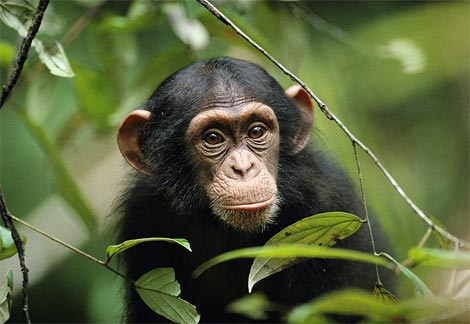Monkey knows how to plan
Monkeys can plan for future needs like humans with the ability to self-control and imagine future events.
In her research, Mathias and Helena Osvath of Sweden's University of Cognitive Sciences, were the first to provide evidence of the possibility of planning ahead for the future of non-human species. Their findings are published online this week in Animal Cognition - Springer.
Planning for the future is a complex skill that is thought to be unique to humans, and has never been convincingly verified in other primates. For people, planning for future needs depends primarily on two intellectual abilities: self-control, meaning the ability to repress the immediate trends for future benefit; and the ability to think over time, which means an objective mind experience of a past or future event.
In a series of four experiments, Mathias and Helena Osvath studied whether chimpanzees and orangutans could put aside the immediate trends for future needs. It is the basis to prove autonomy as well as the ability to plan ahead, not merely to meet immediate needs through hasty actions.

A small chimp.(Photo: National Geographic)
Two chimpanzees and a male orangutan, belonging to Lund University Primate Research Station at Furuvik Zoo, were shown a hose and how to use it to get juice. Then people tempted them with their favorite fruits next to the tap to check their repressive ability to choose the immediate reward (favorite fruit) to choose the tool for giving them rewards greater than 70 minutes later. (fruit juice). Monkeys choose taps more times than fruits, which suggests they can make decisions for future needs, even in the face of an immediate reward.
Then some new tools that monkeys have never met are given: a device with the same function as a faucet, along with two objects to distract. Deliberately, the monkeys chose a device that had the same function as the faucet, took it to the reward room and used it appropriately. This proves that they choose that tool based on its functional attributes. According to the authors, this is a sign of monkeys predicting a future event , meaning figuring out how to use a new device to get juice.
One of the decisive experiments excluded the ability to learn association as an explanation for these results. Associated learning has been proposed to explain the findings in a number of studies of planning possibilities in animals (corvid and monkey birds), so such studies have not been accepted as by evidence of planning ability in non-human species.
- 40 interesting facts about monkeys that you don't know yet
- India: Sterilizing monkeys disturbed the city
- Do monkeys eat bananas?
- The first time successfully extracted the mysterious monkey species DNA in Jamaica
- Monkey Actinidiaceae - Super grade fruit
- 'Monstrous' in nature: Japanese monkeys do 'that' with ... deer
- Found monkey thought extinct
- Culture in the monkey world
- No need to keep still can play iPad
- Found the oldest fossil monkey in America in Panama
- Prepare to
- Shocking discovery of monkey's memory
 Animal 'suffering' after hibernation
Animal 'suffering' after hibernation Why do goats climb well?
Why do goats climb well? Scientists were surprised to see chimpanzees eating turtles
Scientists were surprised to see chimpanzees eating turtles Giant catfish died deadly due to drought in Thailand
Giant catfish died deadly due to drought in Thailand